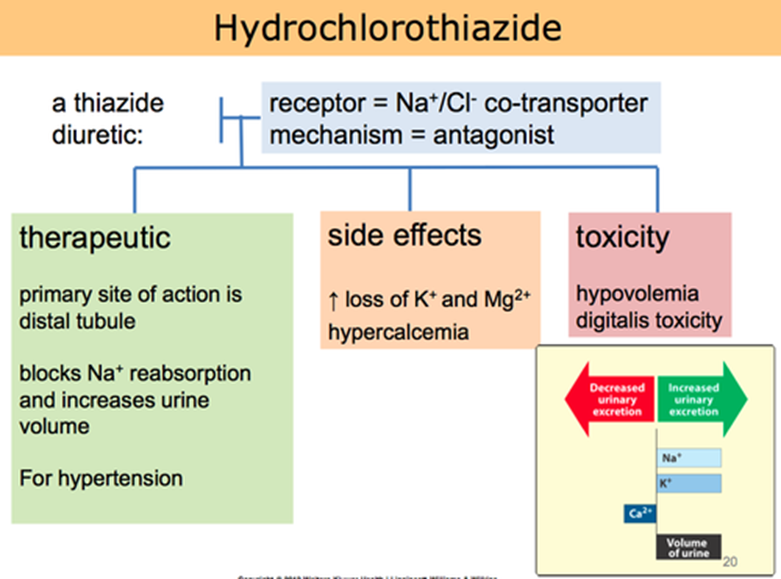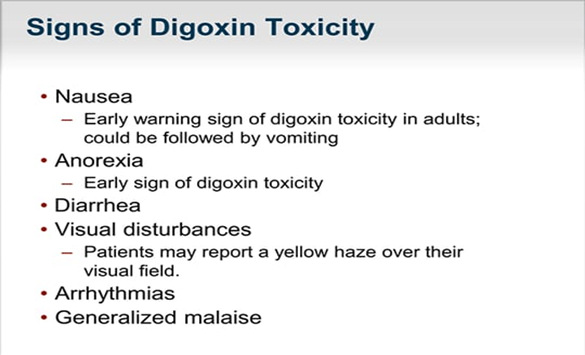A nurse is caring for a client who has heart failure and is taking hydrochlorothiazide. The nurse should monitor the client for which of the following manifestations as an adverse effect of the medication?
Hypokalemia
Hypermagnesemia
Hypernatremia
Hypocalcemia
The Correct Answer is A
Choice A Reason:
Hypokalemia is correct. Hydrochlorothiazide is a thiazide diuretic that promotes the excretion of sodium and water in the kidneys, leading to increased urine production. However, it can also cause the loss of potassium (hypokalemia) as a side effect. Hypokalemia can manifest with symptoms such as muscle weakness, fatigue, irregular heart rhythms, and muscle cramps.
Choice B Reason:
Hypermagnesemia is incorrect. Hydrochlorothiazide typically promotes the loss of magnesium rather than causing elevated magnesium levels.
Choice C Reason:
Hypernatremia is incorrect. Hydrochlorothiazide is more likely to cause a decrease in sodium levels (hyponatremia) rather than an increase (hypernatremia).
Choice D Reason:
Hypocalcemia is incorrect. Hydrochlorothiazide can cause increased excretion of calcium but it's not a common adverse effect compared to the loss of potassium (hypokalemia).

Nursing Test Bank
Naxlex Comprehensive Predictor Exams
Related Questions
Correct Answer is A
Explanation
Choice A Reason:
Visual disturbances is the correct findings. In individuals taking digoxin, visual disturbances such as blurred or yellow-tinted vision can indicate early signs of medication toxicity. This symptom often requires prompt medical attention, as it can precede more severe complications.
Choice B Reason:
Sudden weight gain is not correct. While weight gain can be a symptom of worsening heart failure, it's not typically associated specifically with digoxin toxicity. It's more commonly related to fluid retention in heart failure.
Choice C Reason:
Potassium 4.4 mEq/L is not correct. This potassium level is within the normal range. Digoxin toxicity can be exacerbated by low potassium levels, but a normal potassium level doesn't directly indicate digoxin toxicity.
Choice D Reason:
Insomnia is not a typical early sign of digoxin toxicity. It's more commonly associated with issues like difficulty sleeping rather than being a direct symptom of digoxin toxicity.

Correct Answer is B
Explanation
Choice A Reason:
Extravasation is incorrect. This occurs when the intravenous fluid leaks into the surrounding tissue rather than remaining within the vein. It may cause swelling, pain, and potential tissue damage due to the infused solution's irritant effects.
Choice B Reason:
Phlebitis is correct. Phlebitis refers to the inflammation of a vein often characterized by redness, warmth, swelling, and tenderness along the course of the vein. It can occur due to various reasons, including irritation from the IV catheter, chemical irritation from the infused solution, or infection.
Choice C Reason:
Infiltration is incorrect. Infiltration refers to the inadvertent leakage of the infused fluid into the surrounding tissues. It may cause swelling and discomfort but doesn't typically present with redness and inflammation along the vein.
Choice D Reason:
Venous spasm is incorrect. Venous spasm involves the involuntary contraction of the vein, which can occur in response to irritation or trauma. It may cause temporary difficulty in IV access but does not usually present with redness and inflammation along the vein as the primary signs.
Whether you are a student looking to ace your exams or a practicing nurse seeking to enhance your expertise , our nursing education contents will empower you with the confidence and competence to make a difference in the lives of patients and become a respected leader in the healthcare field.
Visit Naxlex, invest in your future and unlock endless possibilities with our unparalleled nursing education contents today
Report Wrong Answer on the Current Question
Do you disagree with the answer? If yes, what is your expected answer? Explain.
Kindly be descriptive with the issue you are facing.
